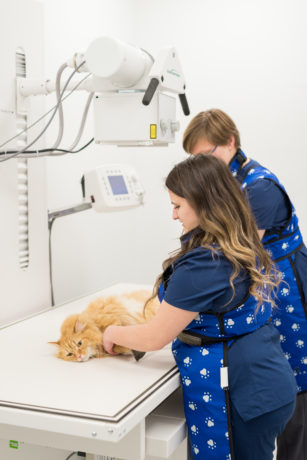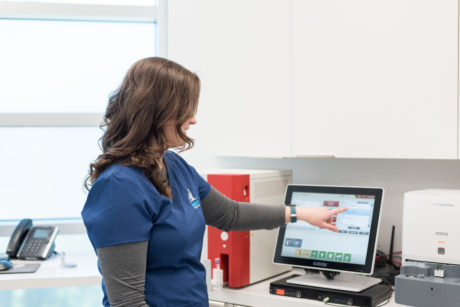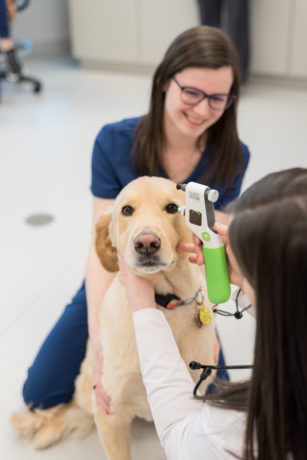Hammonds Plains Veterinary Hospital has a full in-house lab which allows us to offer many common point-of-care diagnostic tests.
We are also partnered with external laboratories for situations where more advanced testing or specialist input is required.
Diagnostic tests are useful when dealing with sick pets as they give us an idea of what organ systems are affected, how serious the illness is, and what treatment measures should be taken. Diagnostic tests can also be used as a tool for early disease detection. In the case of many chronic diseases, we are able to see changes in blood work long before we see signs in the patient. Detecting diseases early allows us to prevent or delay the onset of significant symptoms which may affect your pet’s quality of life.
When bringing in a sick animal, your veterinarian will often discuss recommended tests so that you can decide on a course of action together. We also encourage owners to ask about early disease detection during visits.
We offer the following diagnostic tests in-house:
Imaging
 X-Ray
X-Ray
The mainstay of diagnostic imaging in general practice, X-rays allow us to look inside your pet. In veterinary medicine, the uses are mainly for the diagnosis of bone and joint concerns as well as determining if beloved Fido ate your favorite earrings again. The X-ray also helps us diagnose conditions such as pneumonia, asthma, lung tumors, enlarged internal organs, and bladder stones.
Ultrasound
Hammonds Plains Veterinary Hospital offers comprehensive abdominal ultrasounds. This can be a valuable and minimally invasive diagnostic tool in order to evaluate important organs such as the liver, spleen, kidneys, and bladder, as well as other vital structures within the abdominal cavity. The ultrasounds are performed in-house and sent to a radiologist for interpretation.
Contact Us TodayLaboratory
 Complete Blood Cell Count
Complete Blood Cell Count
A way to measure the percentage of white and red blood cells as well as platelets in a given sample. We can use this test to determine if an animal is anemic, suffering from an inflammatory condition, and gain insight into a number of possible conditions.
Blood Chemistry Profiles
A reflection of internal organ function as well as electrolyte status. These profiles are important in everything from a vomiting puppy to a normal-appearing senior dog or cat. The blood chemistry profile is the mainstay of point-of-care veterinary testing in both early disease detection as well as the treatment of sick pets.
Urinalysis
Useful in identifying urinary tract infections, this test can also offer information on many other issues. A urinalysis helps us determine how well the kidneys are functioning, helps screen for diabetes, and helps identify bladder stones. In conjunction with other testing, it is an essential part of diagnosing a number of diseases.
Fecal Flotation
Routine fecal flotations may be an alternative to regular monthly deworming in your pet. A fecal flotation allows us to determine if there are parasite eggs in your animal’s feces and deworm if they are present. We will also typically run fecal flotations in diarrhea cases, as a number of worm and non-worm fecal parasites can be at fault. There are also more specialized fecal tests generally reserved for diarrhea cases such as giardia testing and parvovirus testing.
SNAP-4dx
A screening test for tick-borne illnesses such as Lyme disease and Anaplasmosis, two diseases present in Nova Scotia and spread by our increasing tick population. These diseases can lead to a variety of signs ranging from flu-like symptoms and swollen joints to severe organ diseases and neurological problems. The 4dx test is a quick, in-house test that can be used to screen patients who are showing common symptoms to rapidly rule out exposure. If an animal tests positive and is symptomatic, other tests and treatments may be recommended.
The 4dx test is also a great screening tool for Heartworm. Heartworm is a mosquito-borne disease found in Canada and the United States, as well as other parts of the world. Animals become infected via mosquito bites and adult worms can develop in the heart chambers. This can lead to congestive heart failure. Most veterinary dewormers contain a Heartworm preventive and offer excellent prevention when given monthly, however, there may be times when testing is warranted.
 Tonometry
Tonometry
the measure of fluid pressure inside the eye. Changes to this pressure can provide valuable information about several disease processes that can be taking place within the eye. A Tonovet is a deflection tonometer that measures the pressure by lightly tapping on the surface of the eye and measuring how much it deforms. Today’s modern tonometers can measure the eye pressure several times in only a second, allowing for quicker diagnosis of problems with less stress to your pet.
Contact Us Today
 X-Ray
X-Ray Complete Blood Cell Count
Complete Blood Cell Count Tonometry
Tonometry